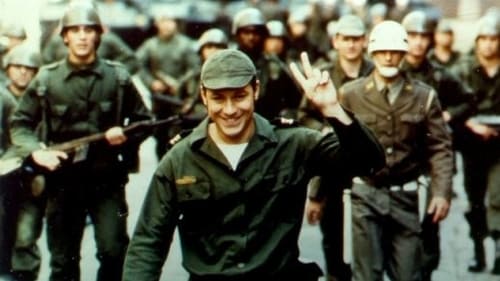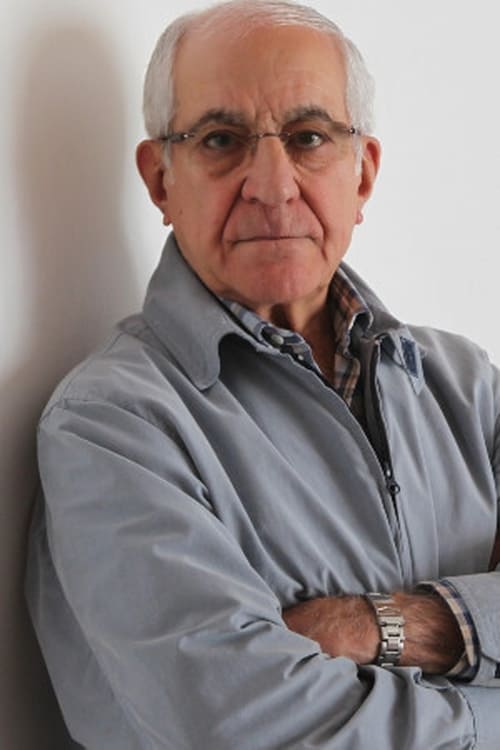Otelo Saraiva de Carvalho
出生 : , Lourenço Marques, Portuguese Mozambique
略歴
Otelo Nuno Romão Saraiva de Carvalho, is a retired Portuguese military officer. He was the chief strategist of the 1974 Carnation Revolution in Lisbon. After the Revolution, Otelo assumed leadership roles in the first Portuguese Provisional Governments, alongside Vasco Gonçalves and Francisco da Costa Gomes, and as the head of military defense force COPCON. In 1976, Otelo ran in the first Portuguese presidential election, in which he placed second with the base of his support coming from the far-left. In the 1980s Otelo was accused of having involvement with the controversial Forças Populares 25 de Abril.

Self
Documentary short about the April’s Captains and the Carnation Revolution from the point of view of the MFA (Armed Forces Movement)- a coalition of Military officers – namely Captains and Majors – who banded together to overthrow the Authoritarian regime that ruled Portugal for over 40 years.

Self (revolutionary captain)
The operational commander of the "Captains Movement", describes and recreates a quarter of century later the crucial 24 hours of April 25, 1974, that would topple the Portuguese government and start a democratic regime in Portugal - since another military coup, May 28, 1926, installed a one-party dictatorship there. The scenes in the claustrophobic operation room are recreated, with him alone and a few voices.

Oscar (uncredited)
Story of the 1974 coup that overthrew the right-wing Portuguese dictatorship--which continued the fascist policies of long-time dictator Antonio Salazar--and of two young army captains who were involved in it.

Himself
A dozen of the revolutionary Army officers that played eminent parts in the change of political regime in Portugal, from a military dictatorship to a social-democracy, read a book to a young girl, describing in a poetic, yet realistic way, what happened in the streets, and minds, of her People in April 25, 1974.

Mayor
Rui Sequeira, a former fighter in the Colonial War, resident of a small village of Alentejo, celebrates another anniversary of the Carnation Revolution in the company of his wife and her daughter, the young Sara, with which he has a not so good relationship. On the night of the celebrations, the death of a friend forever alters his live, waking up a whole past long dormant.

Self
The colonial war. Remembering the past, filming the present, thinking about the future. Collection of testimonies of ex-combatants still alive and archival footage.

Documentary in which the main events that marked the country and Portuguese society in the years 1974 and 1975 are chronologically addressed. The decay of the Marcelist regime, the Revolution of April 25, the troubled period of the Ongoing Revolutionary Process (PREC) , the failure of the Coup of 25 November. A film produced based on archival footage, interspersed with testimonies from some of the actors in the events of that time, to mark the 20 years of the Carnation Revolution.

Writer
"Essay on the Military and the Power", a phrase that also belongs to the title of "Gestures & Fragments", sums up the spirit of the film, based on three points of view on the same theme: Otelo Saraiva de Carvalho and Eduardo Lourenço, in their own roles, and the one played by Robert Kramer, as an American journalist bent on seeking explanations for the process of the Portuguese Revolution.

Himself
"Essay on the Military and the Power", a phrase that also belongs to the title of "Gestures & Fragments", sums up the spirit of the film, based on three points of view on the same theme: Otelo Saraiva de Carvalho and Eduardo Lourenço, in their own roles, and the one played by Robert Kramer, as an American journalist bent on seeking explanations for the process of the Portuguese Revolution.

Himself (revolutionary captain)
Using film and television footage taken during the revolutionary movement of April 25, 1974 in Portugal, and mixing it with music and live interviews with common people, the director conveys a vivid account of the period in which a military coup evolved to a socialist revolution, then was tempered into a formal European style democracy.

Self (archive footage) (uncredited)
A man exiled in Paris makes various trips to Portugal after the Carnation Revolution. Each trip is represented by a woman.

Self (uncredited)
The daily experiences of many antifascists - who suffered, until the political prison, which sealed his esteem and united them in a covenant of justice against a "pide" assassin (eted). But the April 25 and May 1, to September 28 and March 11, follows the November 25 - striking dates a forthcoming story. Time caused the wear of the revolutionary process, exacerbating social and economic problems. In the intellectual groups of the left, where the ideological coherence flew over the everyday practice, is dug a crisis of identity and options. An early vote, perhaps radical, unites -still - a determined activist and a journalist who wonders ...


